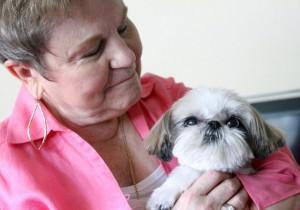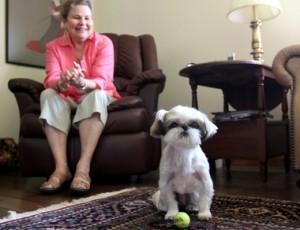 They can sniff out dangerous drugs, missing people and hidden explosives, but it turns out that dogs may also be capable of detecting much subtler ticking bombs — cancerous cells.
They can sniff out dangerous drugs, missing people and hidden explosives, but it turns out that dogs may also be capable of detecting much subtler ticking bombs — cancerous cells.
Just ask Pitman resident Nancy Granato.
Four years ago, Granato was sitting at home, watching her granddaughter Domenica’s shih tzu Taffy while she was at school, like she did every weekday. While sitting on Granato’s lap, however, the tiny shih tzu suddenly starting circling around in her lap and gave a swift nudge directly to Granato’s left breast.
Then, Taffy got down on the floor and did something Granato and her husband Lou had never seen before — she barked. And she wouldn’t stop.
“We thought she was mute for a long time, because she didn’t bark,” Granato recalled. “But she would not stop barking.”
She felt the spot Taffy nudged and found a strange lump. Not a hard one, but a small, soft one.
Concerned, she got tested, but nothing out of the ordinary showed up on the mammogram.
“I said, ‘A lump is a lump, I want to get to the bottom of it,’ ” Granato recalled.
Undeterred, she went for an ultrasound. While the doctor said she could in fact feel and see something, it was probably nothing to be concerned about.
On the way home from the doctor’s office, however, Granato wasn’t convinced. So she called a surgeon, and he told her to come in for a biopsy to be sure.
Four days later, she heard the news she had feared but anticipated: It was cancer.
“I did listen to the dog, but I also listened to me,” she said.Granato is not alone. The concept of dogs’ capability to sniff out cancerous cells isn’t the work of science fiction — it’s the work of scientists and veterinarians currently working on a study at the University of Pennsylvania School of Veterinary Medicine’s Working Dog Center in Philadelphia.
In conjunction with other departments at the university, as well as their medical school’s gynecology/ oncology division and the Monell Chemical Senses Center, dogs there are being trained to detect ovarian cancer in its earliest stages. More specifically, the dogs are smelling the chemical changes — and the “odorants” they give off — when normal cells are altered by cancerous ones.

A recent study at Schillerhoehe Hospital in Germany showed that specially trained dogs were able to detect 71 out of 100 patients with lung cancer by smelling their breath, and other studies have shown results with dogs trained to sniff out breast, colon and skin cancers.
Researchers hope they’ll be able to figure out just what odorant compounds the dogs are smelling and use that information to fuel early detection of cancers, a crucial part of successful treatment.
Since Granato was still in the first stage of breast cancer, they were able to remove the lump via a lumpectomy just two weeks after diagnosis. While she was able to avoid a mastectomy, she also had to undergo 34 grueling chemotherapy treatments.
“It was very rough. I was exhausted,” Granato said. While she generally held it together during treatment, she said, Taffy was there for her when she couldn’t.
“I cried initially, and I held the dog for a long time,” said Granato, who has now been in remission for four years.
“We call her our little miracle dog,” her husband, Lou Granato, said. He added that, while many people don’t believe them when they tell Taffy’s story, the doctors weren’t surprised.
“[The doctor] said there’s something in the breath they pick up on. They think it’s most dogs,” he said. It makes sense to them that Taffy, who spends most days on Granato’s lap, would notice a subtle change in her scent.
“[The doctor] said I may have been weeping from the breast, and she may have picked up on that,” Granato said.
Either way, she said, the experience speaks volumes not just about Taffy’s keen senses, but about the need to stand up for yourself to doctors when you know something is truly wrong.
“You have to listen to both,” she said. “You have to be your own person and listen to your self,” as well as to signs and signals from elsewhere.
That’s why she wasn’t too concerned when doctors found another lump in her breast just this past September, during one of her frequent check-ups.
“I kept saying, ‘The dog didn’t bark,’ ” Granato said. “It can’t be.”
When the results came back, Taffy was right again. The lump was benign.
~ Courtesy of NJ News
Tags: dog alerts to cancer, dog finds cancer, dog sniffs out cancer
